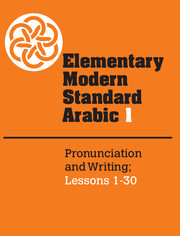INTRODUCTION
Published online by Cambridge University Press: 05 June 2012
Summary
This book presents the basic structures of Modern Standard Arabic (MSA), that formal Arabic which is written and spoken in the contemporary Arab World. In its written form it is used almost exclusively in any printed publication anywhere in the world today; as such it is the direct descendent of the Arabic of the Koran, the poetry of Pre-Islamic Arabia, and the classical literature of the Golden Age, the major differences being in lexicon and style. It is also an oral medium of expression used in formal situations ranging from a radio newscast to a lecture or other formal address to an international conference. Used orally it may be modified in varying degrees, depending on such factors as the nature of the occasion, the makeup of the audience, the speaker's control of MSA, etc. MSA is a universal form of Arabic learned in schools across the Arab world; it is opposed to dialectal or colloquial Arabic, of which there is a particular variety for each community and differs according to region and such social factors as religion, socio-economic status, etc. The dialects are used for all non-formal situations–at home, at work, social occasions, etc.–all the usual day-to-day activities.
The Arab does not keep MSA and his own dialect separate, but mixes them according to the degree of technical complexity of his subject, the degree of formality of the occasion, etc.
- Type
- Chapter
- Information
- Elementary Modern Standard Arabic , pp. v - xPublisher: Cambridge University PressPrint publication year: 1983



